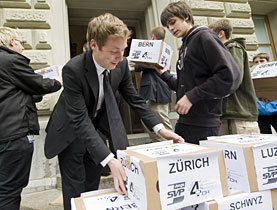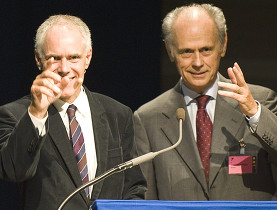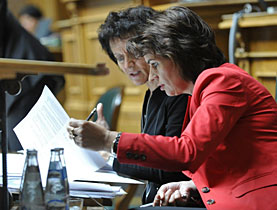EU labour treaty goes to third public ballot

Voters in Switzerland will have the final say on the continuation and extension of a key labour treaty with the European Union.
Small rightwing groups collected the necessary signatures for a nationwide vote likely to take place next February.
The Federal Chancellery confirmed on Monday that the youth wing of the rightwing Swiss People’s Party, the Lega dei Ticinesi and the far-right Swiss Democrats handed in 51,348 valid signatures last week, enough to force a referendum.
The groups were struggling to achieve their goal within the required deadline – 100 days – because both the main Swiss People’s Party and the Campaign for an Independent and Neutral Switzerland (Cins) refused to grant financial or logistical support.
They are among the most ardent critics of closer ties with the EU.
“It is a fabulous result, also given that we were not helped by the others,” Bernhard Hess of the Swiss Democrats told Swiss television.
He is optimistic that the February 8 vote will be successful for his group.
“Voters will most likely be critical of the labour deal, especially in times of economic difficulties,” he said.
Economic benefits
The opponents of the labour deal will face a formidable alliance.
Four out of the main five leading political parties made it clear they will support the treaty – part of a series of bilateral accords between Switzerland and the EU – which was approved by parliament in June.
“The bilaterals brought Switzerland back on the path of economic growth,” said a joint statement by eight parties including the centre-right Radicals and Christian Democrats, as well as the centre-left Social Democrats and the Greens.
They said about 190,000 jobs were created over the past three years, and special measures against salary dumping helped prevent a negative impact.
The Swiss Business Federation, economiesuisse, said it was crucial not to endanger the bilateral treaties.

More
Referendum
Dilemma
The People’s Party is divided over the issue. Some cantonal chapters are eager to combat the labour deal, while the party leadership appears to opt for a boycott of the vote in February.
The party’s controversial strongman and former justice minister, Christoph Blocher, in June persuaded his followers to stop their support for the referendum.
Campaigners were fighting the extension of the labour treaty to new EU members Romania and Bulgaria but many of them are not against the continuation of the accord with the other 25 states.
However, parliament lumped the two issues together, arguing rejection of the extension would inevitably prompt Brussels to possibly stall the existing treaties.
It will be the third time the Swiss electorate decides on the labour agreement, which gives unrestricted access for EU citizens to jobs in Switzerland and vice versa.
Voters first approved the labour treaty, also known as free movement of people accord, in 2000 and confirmed it in 2005.
swissinfo, Urs Geiser with agencies
Parliament approved the extenstion and continuation of the labour treaty in June.
It decided to lump both issues into one bill.
The cabinet which also approved both issues came out in favour of two separate bills.
The vote in February 2009 will be the sixth time the Swiss will be voting on bilateral treaties with the EU.
Voters in 1992 narrowly rejected joining the European Economic Area treaty, a halfway house to EU membership.
Instead Switzerland and the EU concluded 16 bilateral accords, which came into force in 2002 (extended in 2006) and 2005 respectively. They mainly cover trade and labour as well as asylum, customs and tax issues.
Under the terms of the first package of bilateral treaties with Brussels, Switzerland can review the labour deal by mid-May 2009. Refusal to continue the deal would result in the whole set of accords being suspended.
Negotiations are underway on an electricity agreement. The Swiss government is also seeking to conclude a free-trade accord on agriculture.

In compliance with the JTI standards
More: SWI swissinfo.ch certified by the Journalism Trust Initiative




You can find an overview of ongoing debates with our journalists here. Please join us!
If you want to start a conversation about a topic raised in this article or want to report factual errors, email us at english@swissinfo.ch.